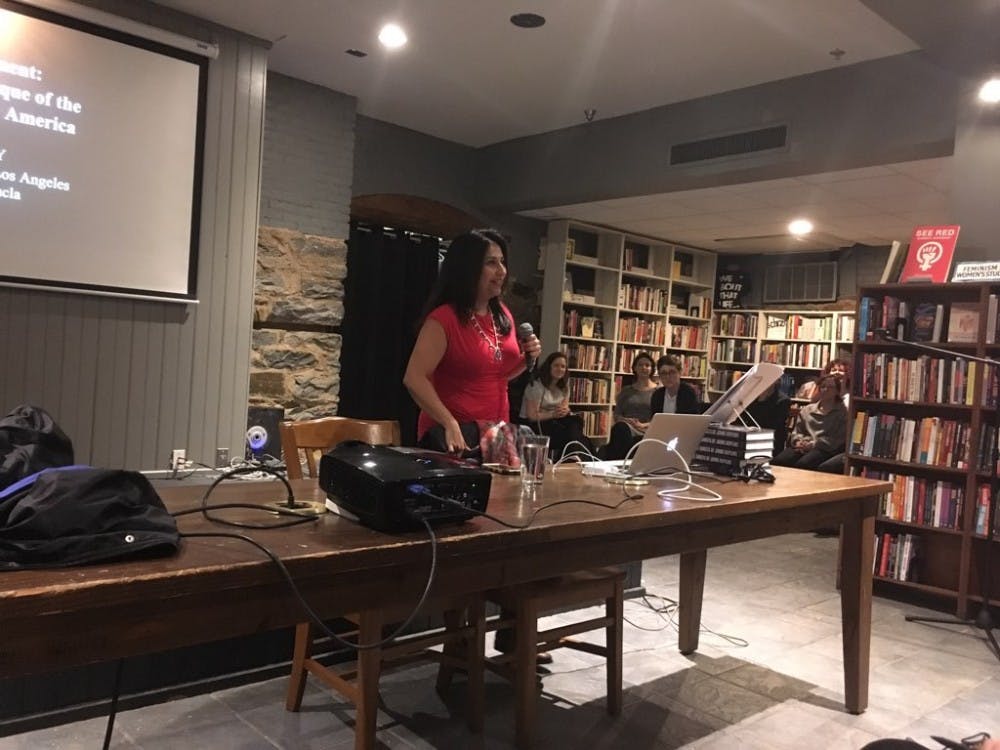Ananya Roy gave the keynote address of the two-day workshop “(anti)Blackness in the American Metropolis” on Friday, Nov. 2 at Red Emma’s Bookstore. Workshop organizers aimed to bring together activists and scholars from different disciplines to discuss issues such as transportation, health, housing, finance and the environment.
Roy, a professor of Urban Planning and Social Welfare at the University of California, Los Angeles gave a talk titled “Racial Banishment: A Postcolonial Critique of the Urban Condition.” She discussed state-instituted violence against people of color with a focus on urban environments.
During the talk Roy evaluated the role of the state in perpetuating eviction, displacement and gentrification, all of which, she argues, have disproportionately affected people of color in cities. She calls this tendency “racial banishment.” Roy added that other minority communities are also affected by this.
Roy cited the criminalization of living in a vehicle in Los Angeles as an example of a law which disproportionately discriminates against people experiencing homelessness.
“This is state-instituted violence. It is the criminalization of vulnerability which reminds us that dispossession is not only the loss of resources and land. It is the loss of personhood,” Roy said.
Roy attributed racial banishment to the actions of the everyday people who perpetuate racism. She describes how when a family of color attempts to move in to a suburb, many engage in deliberate persecution of the family to drive them out.
“Local residents could file complaints about neighbors using code enforcement and push for evictions,” Roy said. “I view racial banishment as the territorial proliferation of prison logic manifested in geographies of forced mobility and illegalized presence.”
Roy went on to explain how universities participate in the displacement of minority groups.
“What are called global universities, are institutions of racial capitalism. They are often quite literally founded on wealth produced through slavery, through the dispossession of indigenous communities to expansion in cities such as Baltimore, but they also are often fueled through forms of research that are extractive and continue racialized expropriation and racialized subjection,” Roy said.
After Roy’s talk, members of the audience responded to an inquiry into universities’ encroachment on neighborhoods and consequent contribution to racial banishment.
One of the hosts of the seminar, Yousuf Al-Bulushi, assistant professor of Global and International Studies at the University of California, Irvine, commented on the theme of displacement in Roy’s talk. He studies urban geography and the political economy of globalization with a focus on Africa.
“I went to school at Duke University in Durham [N.C.]. They have tremendous power in that city; they own a lot of the land and still manage to throw their weight around in ways that gets what they want, but it’s not limited to places like Duke and Hopkins. NYU [New York University] in New York and Columbia University in New York are just as guilty of the same thing,” he said.
Part of the problem, Al-Bulushi explained, is the privatization of education which has led to the concentration of resources in certain areas.
“Universities have become knowledge factories in a knowledge economy, so they are the engine of the broader economy and not the neutral spaces for intellectual exploration that we thought they maybe once were,” he said. “Ananya showed us this doesn’t have to be the case, and you can carve out spaces in these institutions if you are bold, courageous, if you take an explicit position in alliance with those communities that are struggling against displacement at the hands of the university or somebody else, and you can invite these communities as well to take advantage of the resources here.”
Kafui Attoh is an assistant professor at City University of New York’s School of Labor and Urban Studies where he specializes in the role of urban transit systems in a city’s political economy. When asked about if and to what extent universities contribute to racial banishment, Attoh also used Columbia as an example of a university with a contentious relationship with its surrounding community.
“As New York continues to gentrify, there have been accusations thrown at Colombia; they don’t use the term racial banishment but look, they’re facilitating the displacement of a long-term community,” he said.
Emily Billo is an assistant professor of Environment Science at Goucher College that specializes in the unjust and unequal outcomes inherent to environmental decision-making. Her response to the talk and the idea of racial banishment centered on how Goucher has changed how it deals with the history of the land it occupies. The land was once worked by enslaved people.
“Goucher used to be in the city. There’s the old Goucher neighborhood where Goucher used to be located, and they’ve since moved to Towson, certainly following trends of white flight, and now they occupy land that was a plantation, that was slave-owning land. Goucher is slowing opening conversations about what land they occupy and how to bring those conversations, those histories and narratives, into conversations about the institution,” she said.





